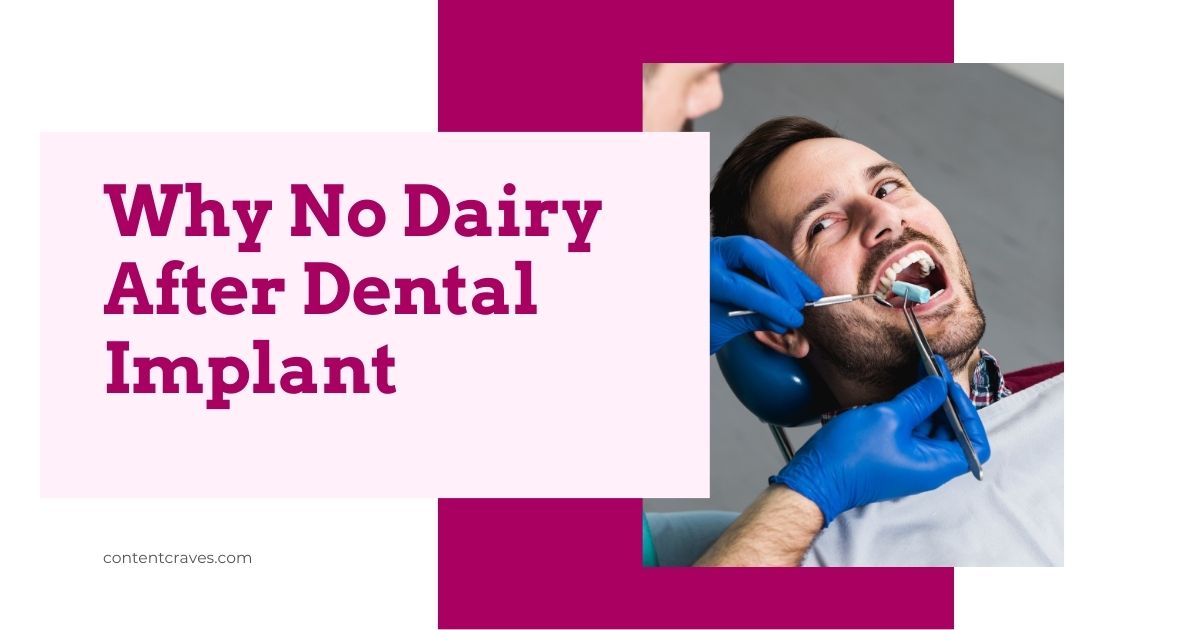Why No Dairy After Dental Implant: Key Reasons Explained
Dental implants are a popular solution for replacing missing teeth. They offer a long-term, natural-looking solution for those with damaged or missing teeth. However, like any surgical procedure, the recovery process after dental implant surgery is critical to the success of the procedure. One important dietary recommendation that dental professionals often suggest is to avoid dairy after dental implant surgery. But why is this advice given? Let’s dive deeper into the reasons behind this recommendation and why it’s important for your recovery.
The Importance of Proper Healing After Dental Implants
After getting dental implants, your body enters a healing phase where the implant integrates with the jawbone in a process called osseointegration. During this time, it’s crucial to avoid anything that could interfere with the healing process, including certain foods. Dairy products, while nutritious, can negatively impact healing for several reasons.
Potential for Inflammation and Infection
One of the most significant concerns after dental implant surgery is inflammation. When your body is healing, inflammation is a natural response, but too much inflammation can slow down the healing process. Dairy products, particularly full-fat versions, can promote inflammation in the body. This inflammation may increase your chances of developing complications, such as infection around the implant site, which could lead to implant failure.
Moreover, consuming dairy can sometimes cause gastrointestinal issues like bloating, gas, or diarrhea, especially if your body is sensitive to lactose. These issues might not directly affect the implant site, but they can contribute to overall discomfort during recovery.
Risk of Infection and Bacterial Growth
Another reason to avoid dairy after dental implant surgery is the potential risk of infection. Dairy products are rich in calcium and other nutrients, but they can also create an environment where harmful bacteria can thrive. The bacteria present in dairy products can contribute to infections, especially in a sensitive area like the mouth. After surgery, the mouth needs time to heal and recover, and adding dairy to your diet could increase the bacterial load, making it harder for the body to combat infections around the implant site.
Impact on Antibiotic Effectiveness
It’s common for dental professionals to prescribe antibiotics following dental implant surgery to prevent infections. Dairy products, especially milk, can interfere with the absorption of certain types of antibiotics, including tetracycline and some penicillin-based medications. When these medications are not absorbed properly, they may not work as effectively, potentially leading to a higher risk of infection or complications.
To ensure the full effectiveness of your antibiotics, it’s advisable to avoid consuming dairy products while taking these medications. This precaution will help your body fight off any infection that might try to develop during the healing period.
Dairy’s Effect on Calcium Balance
While dairy products are a good source of calcium, which is essential for bone health, it’s important to understand the timing of calcium intake after dental implants. Excess calcium intake right after surgery might not be as beneficial as you think. The body’s ability to absorb calcium and use it efficiently is compromised when it is under stress from healing surgery. Too much calcium can potentially interfere with other nutrients that aid in bone healing, like magnesium and vitamin D.
Moreover, consuming too much dairy during the immediate post-operative period might overload the body with calcium, which can affect the balance of other important minerals necessary for optimal healing. A more balanced diet with appropriate calcium intake, when the body is fully ready to absorb it, is a better approach for supporting bone health post-surgery.
Alternatives to Dairy After Dental Implant Surgery
While dairy products should be avoided in the immediate post-operative period, this doesn’t mean you have to miss out on essential nutrients. There are plenty of non-dairy alternatives that can support your recovery after dental implants.
- Calcium-Rich Non-Dairy Foods: Foods like leafy greens (spinach, kale), fortified plant-based milks (almond, soy, oat), tofu, and broccoli provide essential calcium without the potential downsides of dairy.
- Healthy Fats: Instead of full-fat dairy products, opt for healthy fats from sources like avocado, nuts, seeds, and olive oil. These fats support the healing process without contributing to inflammation.
- Protein Sources: Bone healing requires adequate protein, and you can find it in lean meats, poultry, fish, eggs, and legumes. Protein is a vital nutrient that helps with tissue repair and regeneration.
- Vitamin D: Since calcium needs vitamin D for better absorption, get your vitamin D from the sun or fortified foods like cereals, eggs, and mushrooms.
Conclusion
While dairy products can be an important part of a healthy diet, it’s crucial to avoid them immediately after dental implant surgery. The potential risks they pose, including inflammation, bacterial growth, interference with antibiotic effectiveness, and disruptions in calcium balance, can hinder the healing process. By following your dentist’s advice and choosing alternative nutrient-rich foods, you can support your body’s recovery and ensure the success of your dental implants.
FAQs
- How long should I avoid dairy after dental implant surgery?
It’s generally recommended to avoid dairy for at least the first week or two after surgery. However, it’s best to follow your dentist’s advice based on your specific situation. - Can I drink milk after dental implants?
It’s advisable to avoid drinking milk or consuming other dairy products immediately after the surgery to prevent potential complications. - What can I eat after dental implants instead of dairy?
You can substitute dairy with calcium-rich non-dairy options such as leafy greens, fortified plant-based milk, tofu, and almonds. - Why should I avoid dairy while taking antibiotics after surgery?
Dairy can interfere with the absorption of certain antibiotics, making them less effective in preventing infections. - Can I eat cheese after dental implant surgery?
It’s best to avoid cheese in the first few days after surgery due to its potential to promote inflammation and bacteria growth in the mouth.

Post Comment